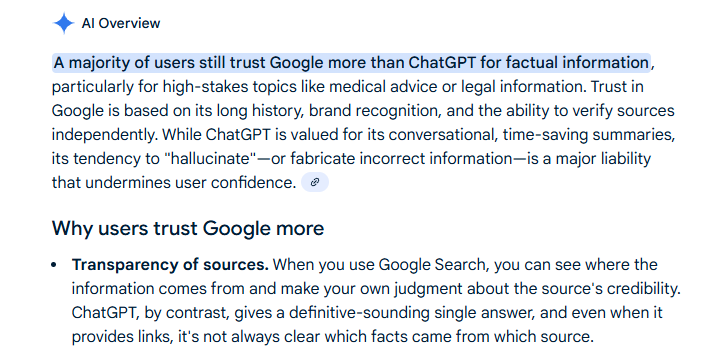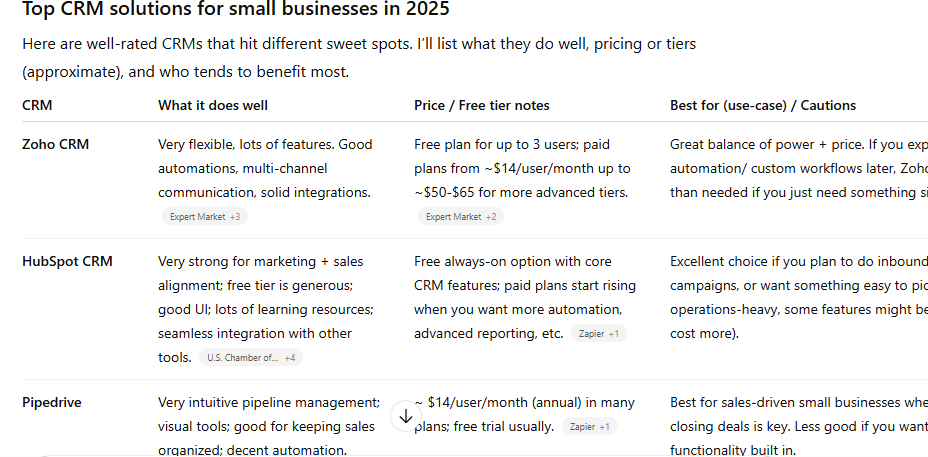3 key AI search limitations for B2B SaaS marketing

A BrightEdge study found that 68% of brands across industries are changing their search strategies to catch the GEO wave.
That’s a big number, but hardly surprising – you’d have to have lived under a rock for about three years (since ChatGPT launched in late 2022) to miss the current.
Still, many B2B marketing leaders I speak with haven’t fully grasped the shape of the opportunity – what GEO can do for their brands and where it falls short.
There’s no question that AI search/GEO/LLMO – whatever you call it (there’s no consensus yet) – is critical to a holistic organic strategy.
But leaning on them too heavily exposes gaps competitors can exploit.
This article outlines three specific limitations of AI search in B2B marketing and how to offset them in your overall organic approach:
- Research on emerging verticals and solutions.
- Nuanced advice for vertical experts.
- Real and perceived objectivity.
Let’s take a closer look at each.
AI search won’t grow awareness for emerging verticals and solutions
Traditional search marketing – SEO or PPC – isn’t set up to bring awareness to new products, verticals, or solutions.
Its intent-based nature relies on a base of pre-established awareness.
AI search shares the same limitations, but there’s another layer.
It’s slower to index content than traditional search engines (because it has to wait for those engines to index it first).
That means awareness for new products and solutions takes even longer to surface in AI search results.
How marketers can adjust
My advice is the same as for traditional search: use a Trojan horse strategy that connects your new product or service to an existing, better-established set of queries and themes.
If you’ve already created awareness around a related term, leverage it to subtly redirect attention. Plant new seeds where awareness already exists.
Dig deeper: 5 B2B content types AI search engines love
AI search isn’t great at nuanced advice for experts
Unlike ecommerce, where the path to purchase is shorter and more direct, B2B buying requires layered, contextual information.
Marketers need to help everyone – from a CFO to an account coordinator – feel confident in a purchase decision. This is not where AI search excels.
AI search models are great for needle-in-a-haystack problems – but not haystack problems.
They excel at pinpointing a precise answer buried in noise, like when a homeowner wants to know how to tap into home equity without refinancing a low-rate mortgage.
An AI model can quickly surface the right product type without forcing someone to sift through irrelevant results.
Where these models fall short is with broader or more strategic questions.
For example, “What’s the best way to modernize my warehouse?”
The output often feels vague or generic because the model can’t account for the unique context of a company’s size, budget, or goals.
In short, AI search can find the needle, but it can’t design the haystack.
Hallucinations and misinformation remain ongoing issues for ChatGPT and its competitors – newer models still aim to “improve accuracy,” which means marketers must take results with a grain of salt.
In B2B, where depth matters, that risk compounds, leaving more room for errors when you’re trying to impress a multi-party buying committee.
How marketers can adjust
Create and distribute content – whitepapers, user guides, case studies – that gives experts the depth they need to feel confident.
I use the word “triangulation” with clients: anticipate and build a presence across the places users go for information.
That includes LLMs, but also Google, Reddit, industry listings, and especially owned media.
Dig deeper: The future of B2B authority building in the AI search era
AI search doesn’t have real (or perceived) objectivity
According to AI Overviews, Google’s results are more trusted than ChatGPT’s:

And if that strikes you as a biased take from a Google property, well, therein lies the problem: those results might not be perfectly objective.
That sentiment generally holds true for just about all AI search, especially since it doesn’t always cite its sources.
As the AI Overview above hints, results for, say, “give me a list of the top {industry} providers” may well be pulling information from the providers it lists in the answer, which is more reflective of good GEO than an earned reputation as a top provider.
Users can ask the LLM to cite sources. In response, they’ll receive a bunch of links that they can follow up on.
But that behavior runs counter to the reason people use LLMs in the first place: they’re looking for one quick, digestible answer, not a directory of links to cross-reference.
This doesn’t diminish AI search’s ability to produce a quick consideration set – and people are absolutely using the tools to request those.

That information is perfectly organized and easy to read. But it lacks any kind of verification and/or social proof, which leaves both the user and brand with important supplemental steps.
How marketers can adjust
When I’m researching tools or software for my team, I use AI search to narrow options and then turn to Google to research each brand more deeply.
I look for case studies, use cases, and reviews, which are far easier to find in traditional SERPs than in LLM results.
Our data for B2B and SaaS clients shows the same behavior.
Since ChatGPT’s launch, bottom-of-funnel research has still relied on assets like Google reviews, G2 or Capterra listings, and brand case studies – not on AI search results.
Brand marketers should think like users: where will people go for validation once LLMs fall short?
Work with your sales team to understand how prospects gather information.
Make sure your owned media answers the questions ChatGPT can’t, and build a strategy for third-party reviews and listings.
Without those pieces, you’ll leak conversions between the middle and bottom of the funnel.
Dig deeper: How to do B2B content marketing the right way (with 5 examples)
Building a complete strategy beyond AI search
There’s nothing fixed about AI search results – model engineers may eventually incorporate reviews and third-party rankings.
Until LLMs can mirror the strengths of traditional search, AI search will continue to have fundamental limitations – ones B2B marketers must plan for in any holistic organic strategy.







Recent Comments